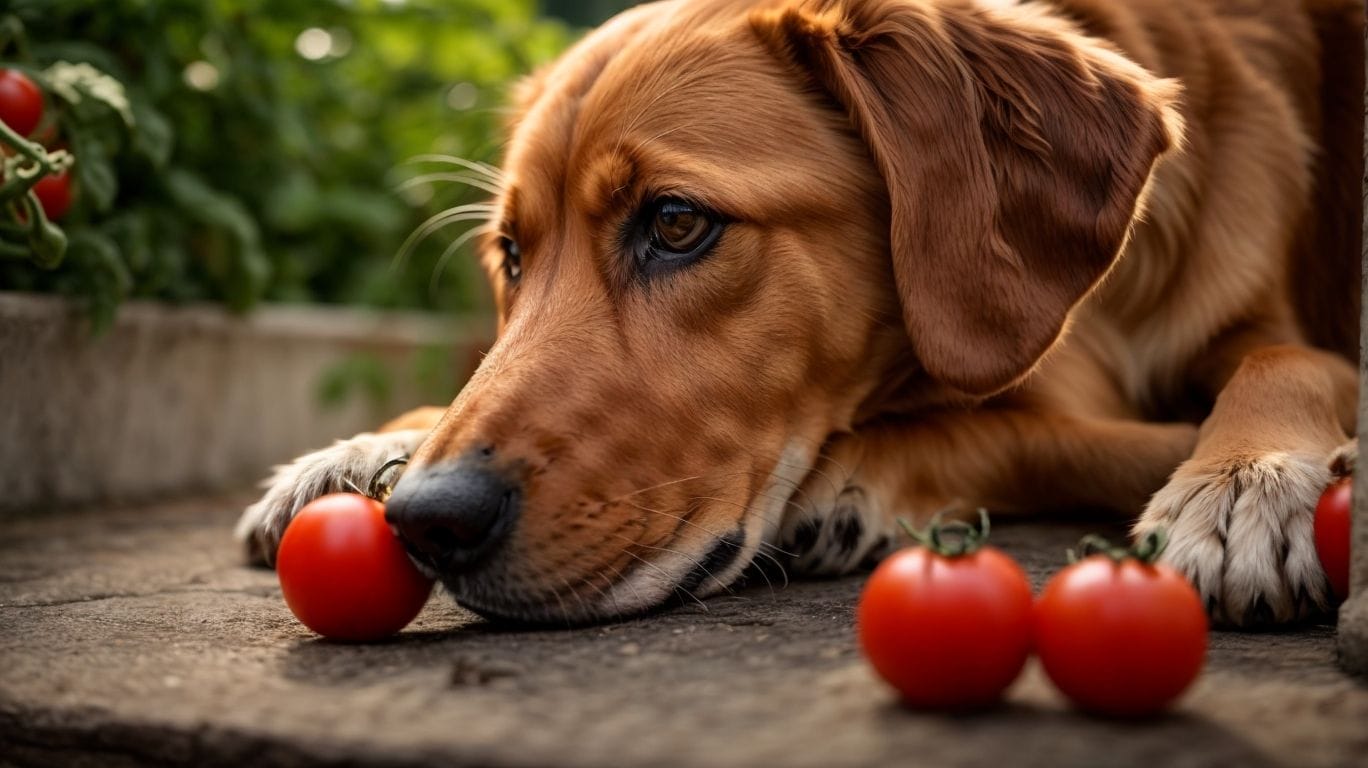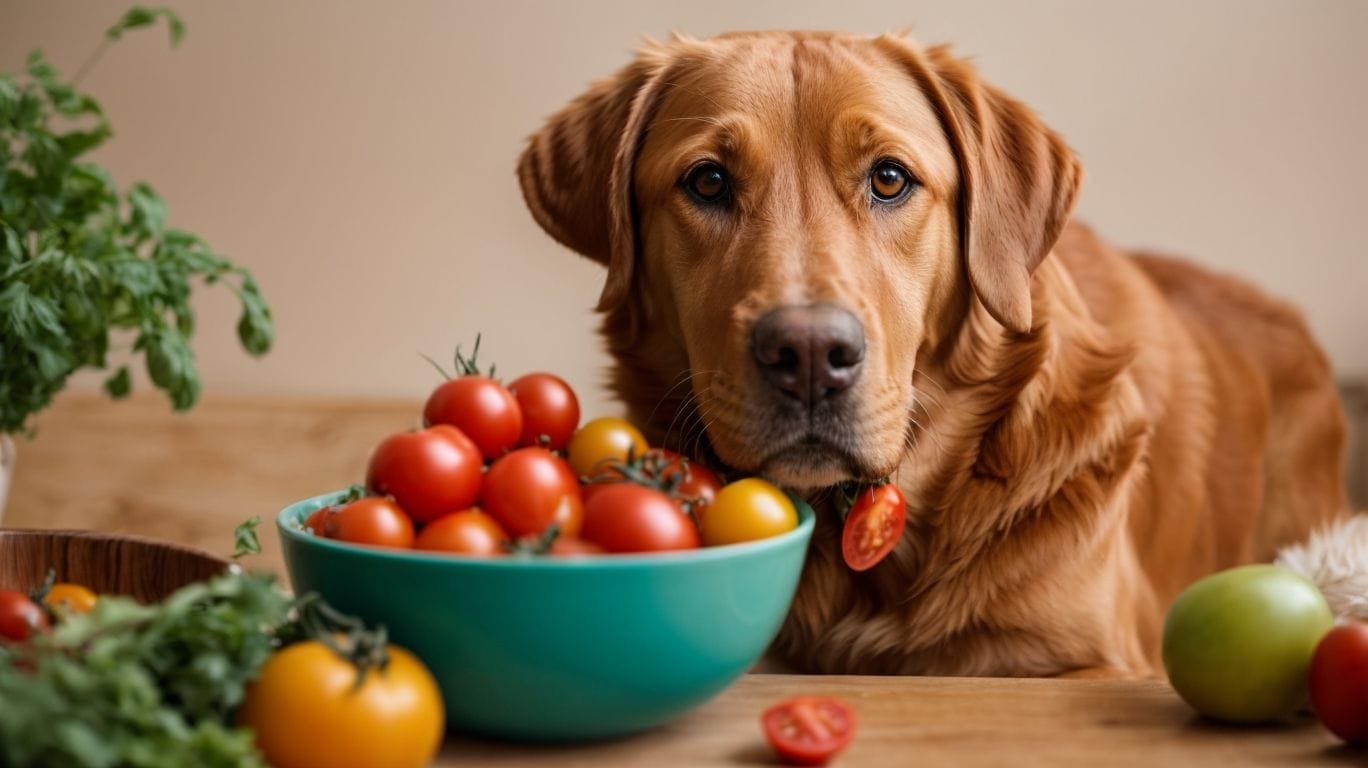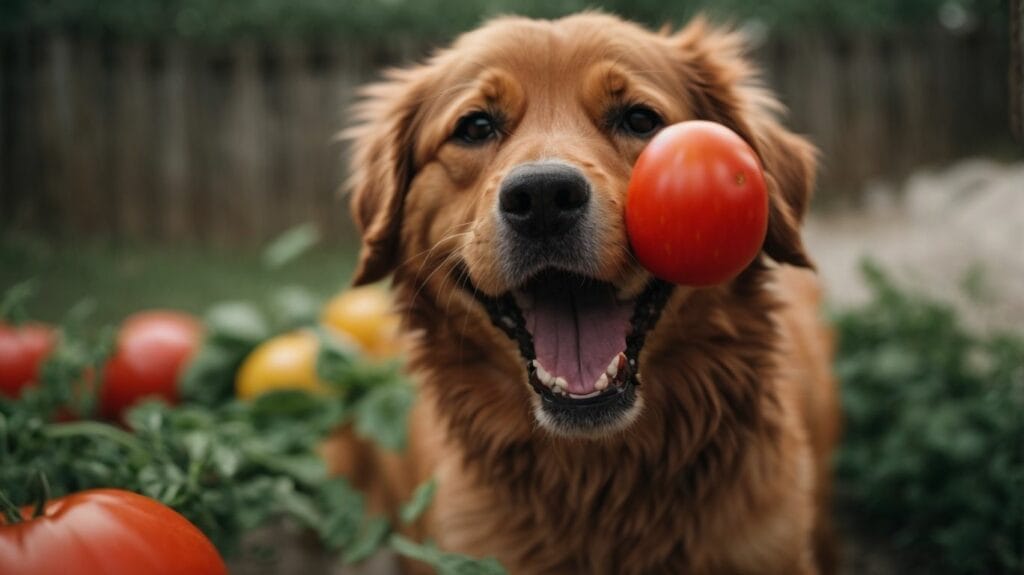Dogs are known for their curious nature when it comes to food, and as pet owners, it is crucial to ensure their safety and well-being. When it comes to tomatoes, pet owners may wonder if this common household ingredient is safe for their furry friends to consume.
Understanding the nutritional value, potential benefits, and risks associated with feeding tomatoes to dogs can help make an informed decision about including them in their diet.
Tomatoes are a rich source of vitamins and minerals, including vitamin C, vitamin K, potassium, and folate. These nutrients can contribute to a well-balanced diet for dogs.
Despite their nutritional value, there are potential risks and considerations when it comes to feeding tomatoes to dogs. These include tomato plant toxicity, as certain parts of the plant can be toxic to dogs. Tomatoes contain solanine, a compound that can be harmful to dogs in large amounts. Gastrointestinal upset may also occur if dogs consume tomatoes in excessive quantities.
While there are risks associated with tomatoes, they also offer potential benefits for dogs when fed in moderation.
The vitamins and minerals present in tomatoes can support various aspects of a dog’s health, including immune function, bone health, and cell maintenance.
Tomatoes contain antioxidants that can help combat harmful free radicals in a dog’s body, potentially offering protection against certain diseases and supporting overall well-being.
It is important to be aware of the potential risks associated with feeding tomatoes to dogs.
Certain parts of the tomato plant, such as the leaves and stems, contain a toxin called tomatine, which can be harmful to dogs if consumed in large amounts.
Tomatoes belong to the nightshade family, and some dogs may have sensitivities to solanine, which can cause gastrointestinal upset or other adverse effects.
Tomatoes are mildly acidic and may cause digestive issues such as indigestion, diarrhea, or vomiting if consumed in excessive quantities or by dogs with sensitive stomachs.
If you decide to feed tomatoes to your dog, it is important to take certain precautions to ensure their safety.
Choose ripe, red tomatoes as they tend to have lower levels of tomatine compared to unripe tomatoes. Avoid giving dogs cherry tomatoes or tomatoes from decorative plants, as these may be more toxic.
Before offering tomatoes to your dog, make sure to remove the stems, leaves, and any green parts. Wash the tomato thoroughly to eliminate any potential pesticides or contaminants.
Feeding tomatoes to dogs should be done in moderation and as part of a balanced diet. Too many tomatoes can cause gastrointestinal upset or other health issues. It is always best to consult with a veterinarian before introducing new foods to your dog’s diet.
If you are concerned about the risks associated with feeding tomatoes to your dog, there are plenty of alternative fruits and vegetables that can provide similar nutritional benefits. Safe options include carrots, cucumbers, blueberries, and apples. Commercial dog food formulated with balanced nutrition can ensure that your dog’s dietary needs are met.
By being informed about the benefits, risks, and proper preparation, you can make the best decisions for your dog’s health and provide a safe and enjoyable diet for them.
Key takeaways:
- Tomatoes can be safe for dogs: While tomatoes are generally safe for dogs to eat, it is important to remove the stems and leaves as they contain solanine, which can be toxic to dogs.
- Nutritional benefits of tomatoes for dogs: Tomatoes are a good source of vitamins and minerals for dogs. They contain essential nutrients such as vitamin C, vitamin A, and potassium.
- Portion control is key: It is important to feed tomatoes to dogs in moderation, as excessive consumption can lead to gastrointestinal upset. Always consult with a veterinarian before introducing tomatoes or any new food into a dog’s diet.
Are Tomatoes Safe for Dogs to Eat?

Photo Credits: Petnarnia.Com by Alan Carter
I’m curious if you can share some tomatoes with your furry friend. Let’s dig into the topic of whether tomatoes are safe for dogs to eat. We’ll uncover the nutritional value of tomatoes for dogs and explore any risks and considerations that come with feeding this juicy fruit to your canine companion. So, before you toss a cherry tomato their way, let’s find out if it’s a treat or better left uneaten!
Nutritional Value of Tomatoes for Dogs
The nutritional value of tomatoes for dogs can provide several benefits for their health. Tomatoes are rich in essential vitamins and minerals, including vitamin C, vitamin A, and potassium. These nutrients support the immune system, promote healthy vision and aid in proper muscle and nerve function. Tomatoes contain antioxidants that help protect cells from damage and reduce inflammation. It is important to note that the nutritional value of tomatoes for dogs should be fed to dogs in moderation. Excessive consumption can lead to gastrointestinal upset. Before incorporating the nutritional value of tomatoes into a dog’s diet, please consult with a veterinarian to ensure they are safe and suitable for your pet’s specific needs.
Risks and Considerations
Risks and considerations when feeding tomatoes to dogs include plant toxicity, tomatine content, and gastrointestinal upset.
|
Potential Benefits of Tomatoes for Dogs

Photo Credits: Petnarnia.Com by William Adams
Discover the potential benefits of tomatoes for your furry friends as we dive into their vitamin and mineral content as well as their antioxidant properties. Unleash the power of tomatoes and explore how they can contribute to your dog’s overall well-being. From boosting their immune system to promoting healthy skin and coat, these juicy fruits pack a nutritious punch. Get ready to learn about the wonders of tomatoes and why they might be a paw-some addition to your canine’s diet.
Vitamin and Mineral Content
The vitamin and mineral content of tomatoes makes them a beneficial addition to a dog’s diet. Tomatoes, with their rich vitamin and mineral content, including vitamins A, C, and K, as well as minerals like potassium and folate, contribute to a dog’s overall health and support various bodily functions. It is important to note that tomatoes should be fed to dogs in moderation and prepared properly to ensure safety. Excessive consumption of tomatoes can lead to gastrointestinal upset. Additionally, it is crucial to be aware that the green parts of the tomato plant, including the stems and leaves, contain solanine, which can be toxic to dogs. Hence, it is always advisable to consult with a veterinarian before introducing tomatoes, with their valuable vitamin and mineral content, into a dog’s diet.
Antioxidant Properties
The antioxidant properties of tomatoes make them beneficial for dogs when consumed in moderation. They are rich in antioxidants like lycopene, which help neutralize harmful free radicals in a dog’s body.
- Neutralizing Free Radicals: Tomatoes, with their antioxidant properties, can effectively neutralize harmful free radicals in a dog’s body.
- Boosting Immunity: Tomatoes contain antioxidants that can strengthen a dog’s immune system, thereby protecting against illnesses and diseases.
- Reducing Inflammation: The anti-inflammatory properties of tomatoes can help alleviate inflammation in dogs with certain health conditions.
- Promoting Overall Health: Tomatoes’ antioxidants contribute to the overall well-being of dogs by supporting their cardiovascular health and promoting healthy skin and coat.
It’s important to note that tomatoes should be served in moderation and without any added seasonings or toppings that may be harmful to dogs.
Other antioxidant-rich fruits and vegetables that can be included in a dog’s diet include blueberries, spinach, and carrots. Choosing high-quality dog food that contains antioxidants is another way to provide these benefits to your furry friend.
Potential Risks of Feeding Tomatoes to Dogs

Photo Credits: Petnarnia.Com by Brian Taylor
Feeding tomatoes to our furry friends may seem harmless, but it’s crucial to be aware of the potential risks involved. In this section, we’ll uncover the dangers of including tomatoes in your dog’s diet. From tomato plant toxicity to solanine content and gastrointestinal upset, we’ll shed light on the various hazards that tomatoes can pose to our beloved pets. So before you toss them a juicy red slice, let’s dig deeper into the risks and ensure our canine companions stay safe and healthy.
Tomato Plant Toxicity
Tomato plants can be toxic to dogs due to the presence of solanine, a compound that can cause gastrointestinal upset. Symptoms of tomato plant toxicity in dogs include drooling, nausea, vomiting, diarrhea, and even paralysis in severe cases. It’s important to be cautious about tomato plant toxicity and keep dogs away from tomato plants, especially when planting them in your garden. If your dog accidentally ingests any part of a tomato plant, contact your veterinarian immediately. To prevent any risks, it is best to feed dogs only ripe red tomatoes without any green parts or leaves.
In a related historical event, in 1979, a massive outbreak of tomato plant toxicity occurred in Australia. A farm had mistakenly used green tomatoes, which are higher in solanine, in the production of tomato sauce. This resulted in over 800 cases of food poisoning, with symptoms ranging from mild nausea to paralysis. The incident served as a wake-up call, highlighting the significance of proper handling and awareness of tomato plant toxicity.
Solanine Content
The solanine content in tomatoes is an important consideration when feeding them to dogs. Here is a table summarizing the solanine content in different parts of a tomato:
| Tomato Part | Solanine Content |
|---|---|
| Tomato fruit | Low to negligible solanine |
| Tomato leaves | High solanine content |
| Tomato stem | Moderate solanine content |
For more information on whether dogs can eat tomatoes, check out the Can Dogs Eat Tomatoes? Article.
It is crucial to avoid feeding dogs any part of the tomato plant other than the fruit. The solanine present in the leaves and stems can be toxic to dogs and may cause gastrointestinal upset. Always ensure that only ripe tomato fruit, with low solanine content, is given to dogs as a treat or ingredient in their meals.
Pro-tip: When introducing tomatoes to your dog’s diet, start with small portions to check for any adverse reactions, and consult a veterinarian for specific dietary recommendations.
Gastrointestinal Upset
Gastrointestinal upset can be a common occurrence in dogs if they consume tomatoes, which can result in symptoms like vomiting, diarrhea, and abdominal pain. The primary cause of gastrointestinal upset in dogs when consuming tomatoes is their high acidity content. Some dogs may have an intolerance or sensitivity to tomatoes, making them more susceptible to experiencing digestive issues. Suppose you observe any signs of gastrointestinal upset in your dog after they eat tomatoes. In that case, it is advisable to avoid feeding them this food in the future and seek guidance from a veterinarian for further assistance.
Preparing and Feeding Tomatoes to Dogs

Photo Credits: Petnarnia.Com by Jordan Mitchell
Discover how to safely prepare and feed tomatoes to your furry friends in the section “Preparing and Feeding Tomatoes to Dogs.” Uncover the various safe tomato options, learn the proper methods of tomato preparation, and explore the importance of portion control. With these insights, you’ll be equipped to make informed decisions and ensure the well-being of your canine companions when it comes to including tomatoes in their diet.
Safe Tomato Options
When it comes to feeding dogs, it’s crucial to prioritize their health by choosing safe tomato options. Here are some recommendations for safe tomato options for dogs:
- Ripe tomatoes: Opt for fully ripe tomatoes as they contain lower levels of solanine, a toxic compound commonly found in unripe tomatoes.
- Sundried tomatoes: These can serve as a safe alternative to fresh tomatoes for dogs since they have reduced water content.
- Cooked tomatoes: Cooking tomatoes can help break down any potentially harmful compounds, making them safer for dogs to consume.
- Tomato sauces: If you decide to feed your dog tomato sauces, ensure they are either homemade or low in sodium and free from any harmful additives.
By selecting these safe tomato options, you can provide your dog with the delicious taste and nutritional benefits of tomatoes without compromising their health.
Proper Tomato Preparation
Proper Tomato Preparation is crucial for the safety of dogs and to minimize any potential risks. To ensure the well-being of your furry friend, it is important to follow these guidelines when preparing tomatoes:
Remove the stems and leaves: These parts of the tomato can be toxic to dogs, so it is essential to eliminate them before feeding.
Thoroughly wash the tomato: This step is necessary to remove any pesticides or bacteria that may be present on the skin.
Cut the tomato into appropriate-sized pieces: It is recommended to cut the tomato into small, bite-sized pieces as they are easier for dogs to chew and digest.
Avoid seasoning or adding any spices: Dogs should never consume seasoned or spiced tomatoes as they can be harmful.
Offer tomatoes as a treat, not a main meal: Due to their high acid content, tomatoes should only be given to dogs in moderation and as an occasional treat.
By following these Proper Tomato Preparation steps, you can ensure that your dog can safely enjoy the benefits of tomatoes without experiencing any adverse effects.
Portion Control
Portion control is crucial when giving tomatoes to dogs to ensure their safety and well-being. Here are some important factors to keep in mind:
Size and weight: Adjust the portion size based on your dog’s size and weight. Smaller dogs should be given smaller portions to maintain proper portion control.
Balance with regular diet: It is important to include tomatoes as only a small part of your dog’s overall diet. Make sure they are getting a balanced diet that provides all the necessary nutrients.
Remove seeds and skin: It is recommended to remove the seeds and skin from tomatoes before feeding them to your dog. This is because the seeds and skin can be difficult to digest and may pose a choking hazard.
Caution with overserving: While tomatoes are generally safe for dogs in moderation, excessive consumption can lead to gastrointestinal upset. It is important to monitor the portion sizes and observe your dog’s reaction. For more information on whether dogs can eat tomatoes, check out Can Dogs Eat Tomatoes?
Alternatives to Tomatoes for Dogs

Photo Credits: Petnarnia.Com by Harold Roberts
Are you looking for tasty alternatives to tomatoes for your furry friends? Look no further! In this section, we’ll dive into dog-safe fruits and vegetables that will have your pup wagging its tail in delight. Plus, we’ll explore the world of commercially available dog food options that can satisfy their cravings while keeping them healthy. Say goodbye to the tomato dilemma and discover a variety of delicious options for your canine companion!
Dog-Safe Fruits and Vegetables
Dog-Safe Fruits and Vegetables can be a beneficial and wholesome addition to a dog’s diet. Consider these options as healthy choices:
| Apples: |
| Slice them into bite-sized pieces after removing the seeds and core. |
| Bananas: |
| These nutritious treats are rich in potassium. Remember to peel them before giving them to your dog. |
| Carrots: |
| Offer raw or lightly steamed carrots as a crunchy and low-calorie option. |
| Blueberries: |
| With their antioxidants, blueberries make a tasty snack for your furry friend. |
| Sweet potatoes: |
| Cook and mash them to provide a nutritious boost to your dog’s meals. |
| Green beans: |
| Whether cooked or raw, green beans are a healthy and low-calorie snack option. |
Remember to introduce new foods gradually and in moderation, paying attention to any allergic reactions or digestive issues. It is always advisable to consult a veterinarian before making significant changes to your dog’s diet.
Commercially Available Dog Food
Commercially Available Dog Food
Commercially available dog food provides a convenient and balanced option for pet owners. It ensures that dogs receive all the necessary nutrients in the right proportions. These commercially available dog foods are specially formulated to meet the unique dietary needs of dogs. They are available in various forms, such as dry kibble, wet canned food, and freeze-dried or dehydrated options. They are made with high-quality ingredients, including meat, vegetables, grains, and essential vitamins and minerals. Commercial dog food undergoes rigorous testing and follows strict regulations to ensure safety and quality. It is essential to choose a reputable brand that offers a variety of options tailored to your dog’s specific dietary requirements.
A dog owner named Emily had a busy schedule and struggled to find time to prepare homemade meals for her dog. She decided to switch to a commercially available dog food brand recommended by her veterinarian. Not only did her dog enjoy the food, but Emily also noticed an improvement in his overall health and energy levels. She was relieved to have found a convenient and reliable option that provided her dog with the nutrition he needed.
Some Facts About Can Dogs Eat Tomatoes?
- ✅ Dogs can safely consume ripe tomato flesh in small quantities. (Source: AKC)
- ✅ The leaves, stems, and unripe green tomatoes of the tomato plant should be avoided as they contain solanine, which is toxic to dogs in large amounts. (Source: Rover)
- ✅ Symptoms of solanine poisoning in dogs include cardiac effects, gastrointestinal upset, loss of coordination, muscle weakness, and tremors. (Source: Rover)
- ✅ While solanine poisoning in dogs is rare, it requires veterinary attention and treatment. (Source: Rover)
- ✅ Some dogs may show allergic reactions to tomatoes, such as hives, coughing, wheezing, swelling, or difficulty breathing, and immediate veterinary attention is necessary if these symptoms occur. (Source: Rover)


